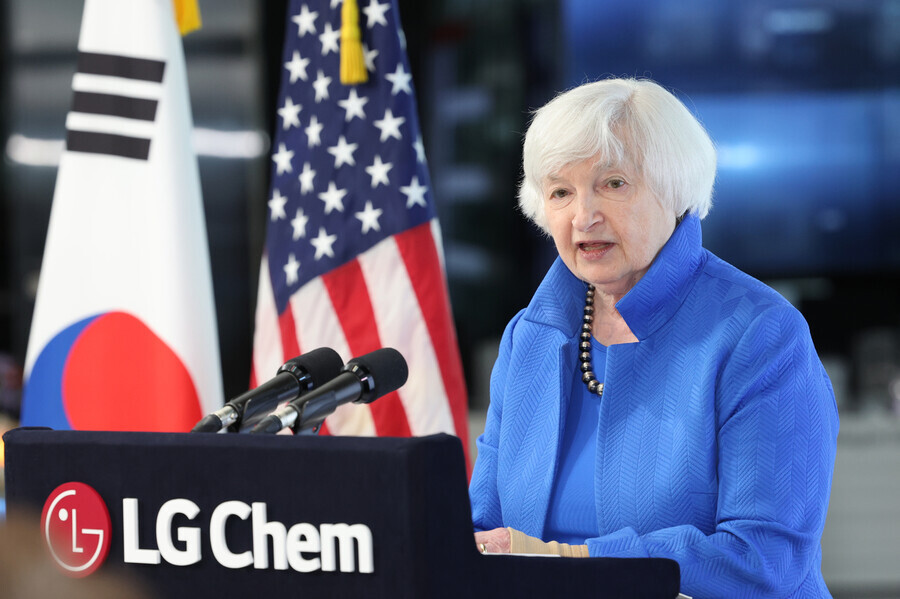[Editorial] US “Chip 4” pitch begs the question: What’s Yoon’s China policy?
China is South Korea’s largest trading partner and a major market — considerations regarding joining the Chip 4 alliance should be made carefully

US Treasury Secretary Janet Yellen delivers an address at LG Sciencepark in Gangseo District, Seoul, on July 19 after touring a gallery featuring next-gen battery technology. (Yonhap News)
Pressure is rising for South Korea to get on board with Washington’s plans to rearrange global supply chains to revolve around the US.
The US is proposing a new initiative called the “Chip 4” alliance, which aims to bring together the US’ own semiconductor technology with Japanese materials and equipment and Taiwanese and South Korean manufacturing capabilities. Washington has asked Korea to decide whether they want to join the alliance by next month.
While visiting Korea Tuesday, US Treasury Secretary Janet Yellen proposed the concept of “friend-shoring” regarding semiconductors and batteries. The concept refers to the US’ aim to build supply chains among allies while also being closely connected to Washington’s goal of excluding China from global supply chains.
Knowing that Korea joining this alliance would without a doubt prompt opposition from China — South Korea’s largest trading partner — it is concerning that the Yoon Suk-yeol administration has yet to adopt an official China policy, even after having been in government for more than two months.
Yellen chose to visit LG Chem, which develops batteries for electric vehicles and battery materials, as the first stop on her itinerary in South Korea.
“Friend-shoring is about deepening relationships between trustworthy trading partners while diversifying supply chains to reduce economic risks,” Yellen said. She also added that “working with allies and partners through ‘friend-shoring’ is an important element in strengthening economic resilience.”
Yellen also criticized China, saying, “We cannot allow countries like China to use their market position in key raw materials, technologies, or products to disrupt our economy or exercise unwanted geopolitical leverage.”
Meanwhile, the South Korean government seems to be actively responding to Washington’s demands.
“I wholeheartedly support the global leadership of the US in the fields of economy and security,” South Korean president Yoon said during a meeting with Yellen.
Requests from the US, the world’s most powerful country and Korea’s closest ally, must not be disregarded. The problem, however, is that there is currently no blueprint for what South Korea-China relations will look like under Yoon.
It is clear that anxiety is high in industrial circles. This is closely connected to the Chip 4 alliance, which will most likely exclude China — South Korea’s largest semiconductor export market and production base. This, in turn, could destabilize the ecosystem of South Korea’s domestic semiconductor industry.
SK Group Chairperson Chey Tae-won echoed such concerns at a recent press conference when he stated that “whether we like it or not, China is a very large market, so giving up [on China] is not an option.”
For South Korea, a country that abides by an open trade policy, it is important to carry out practical diplomacy based on free trade and multilateralism in order to maximize national interests.
Working in solidarity with countries that hold similar interests, South Korea should try to prevent the US and China from going the route of protective trade policies as much as possible. Even if Beijing and Washington continue going on this path, it is important for South Korea to find a way to coexist with China.
Hopefully, South Korea’s China policy under the Yoon administration will be released by next month, which marks the 30th anniversary of the establishment of diplomatic relations between the two countries.
Please direct questions or comments to [english@hani.co.kr]